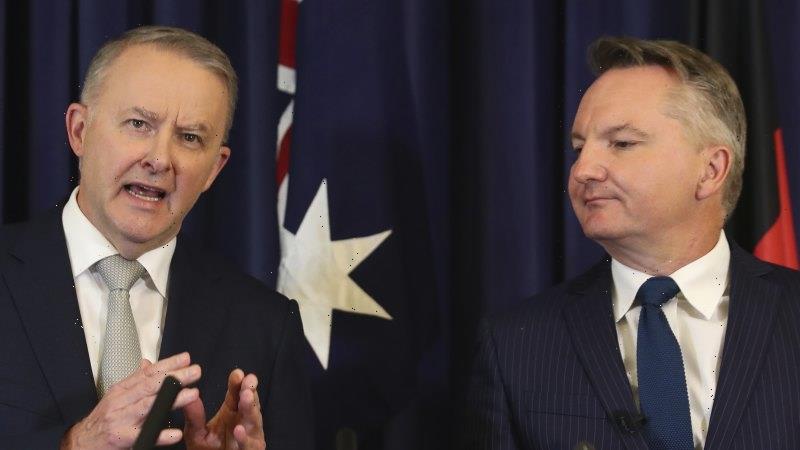Labor will dump a contentious plan to set new fuel standards for millions of motorists in a bid to neutralise a growing political attack from Prime Minister Scott Morrison ahead of a bigger fight on climate change.
The vehicle emission standard will be formally dropped when Labor leader Anthony Albanese signs off on the party’s climate policy with shadow ministers, as they prepare for a caucus briefing this Friday on the coming election campaign.
Labor’s climate spokesman Chris Bowen and leader Anthony Albanese. Mr Albanese reminded caucus members on Tuesday he had often said he would “kick with the wind in the fourth quarter” of the election cycle.Credit:Alex Ellinghausen
Mr Albanese will launch Labor’s bid for power at a campaign rally in Sydney this weekend to start a blitz through marginal electorates before Christmas, readying the party for the official election contest early next year.
The climate policy, including Labor’s target to reduce greenhouse gas emissions by 2030, is being restricted to a small group of shadow cabinet members before climate spokesman Chris Bowen speaks at the National Press Club on Monday.
While some caucus members are pressing for a target that trumps Mr Morrison’s forecast to cut emissions by 35 per cent by 2030 on 2005 levels, others warn against an ambitious goal that exposes the party to attack over the impact on household costs.
The Labor Environment Action Network, an influential group within the party, is arguing for a cut of 45 to 55 per cent by 2030.
“Our target needs to stick close to those of comparable, resource-rich economies – the US has a target of 50 per cent on 2005 levels by 2030; Canada a target 40 to 45 per cent below 2005 levels by 2030,” LEAN co-convenor Felicity Wade said on November 21.
The Labor policy on fuel standards was part of a package in the 2019 election campaign to encourage the adoption of electric vehicles so they would make up 50 per cent of new car sales by 2030, a target that triggered a war of words with Mr Morrison.
The Prime Minister claimed at the time the Labor policy sought to “end the weekend” and said last month the policy tried to “force” customers to switch to electric vehicles, misrepresenting the plan, which set only an aspirational target.
The policy on fuel standards promised to consult on setting more ambitious goals so Australia would phase in the benchmark of 105 grams of carbon dioxide emissions per kilometre for light vehicles, consistent with advice from the Climate Change Authority, an arm of the government.
“These are sensible standards which will bring Australia’s cars into line with those in the United States, which has a similar car fleet to ours, but won’t be as stringent as those operating in the European Union,” Labor said in a statement from its leader at the time, Bill Shorten.
Mr Morrison said on November 11 Labor wanted to “put up your petrol prices” although the policy only called for consultation on changes and did not name a timetable for the new standard.
Even so, Labor will drop this element of its policy package to blunt the Coalition scare campaign.
The party is also taking a cautious approach to the Religious Discrimination Act unveiled by Mr Morrison last week, with the caucus formally deciding on Tuesday to wait for a parliamentary inquiry to report on February 4 before deciding whether it will support the changes.
Mr Albanese told the Labor caucus on Tuesday to prepare for a meeting in Parliament House this Friday to prepare for the election campaign, with Labor national secretary Paul Erickson due to address the group.
While the most recent Resolve Political Monitor in The Sydney Morning Herald and The Age found Labor’s primary vote was 32 per cent, slightly down from 33.3 per cent at the last election, the party’s internal polling suggests it is doing much better.
Mr Albanese reminded caucus members on Tuesday he had often said he would “kick with the wind in the fourth quarter” of the election cycle, adding that they were now in the final quarter and doing what he had planned.
“The government is fracturing to the right and to the left. This is a government that has run its course,” he told the gathering, according to a caucus spokesman.
One day after the government released its draft calendar for Parliament next year, Mr Albanese told colleagues the plan allowed only 10 days of sittings in the lower house before August next year.
He pointed to one feature of the calendar – the absence of any Parliament in the week after Australia Day – to tell MPs to be ready for a March election.
“The government does not deserve a second decade in politics,” he told the meeting.
The calendar includes a March 29 budget, clearing the way for a May election, but this can be changed at any time.
Fascinating answers to perplexing questions delivered to your inbox every week. Sign up to get our new Explainer newsletter here.
Most Viewed in Politics
From our partners
Source: Read Full Article

